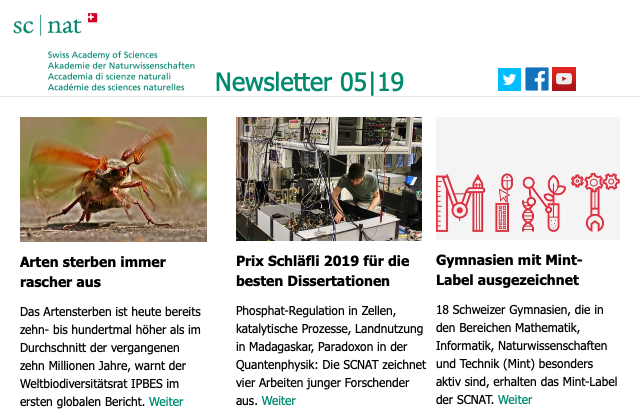EuChemS Brussels News Updates, June 2019

Hello and welcome to the June edition of Brussels News Updates, the monthly EuChemS newsletter keeping you up-to-date on the latest science-policy issues, news and upcoming events and awards.
What a few last weeks it has been! Now that the dust has somewhat settled after the EU elections and the surge in voter participation, we can start looking ahead at what the future European Parliament will look like, and what lies in store for EU science, research, innovation and education.
Parallel to the political tremors, the research community has been presented with cOAlition S’ updated implementation guidelines for Plan S, a plan aimed at rapidly rolling out open access publishing.
Time to scroll down and read our take on the latest policy developments impacting science and chemistry!
You can read the full newsletter online here.
European Highlights, Research, Innovation, Education, Entrepreneurship
Plan S: updated guidelines published, EuChemS responds
Following the analysis of some 600 responses to the call for feedback on the Plan S implementation guidelines, cOAlition S (a coalition of funders with the aim of pushing through a rapid transition to open access publishing) has published its updated implementation guidelines.
EuChemS has acknowledged the work that has been done in order to evaluate the large amount of feedback received. However, many issues continue to persist, most notably the fact that cOAlition S’ stance on other forms of journals as well as on embargo periods has not changed. EuChemS is moreover concerned that the points of view of Learned Societies has not been taken into enough consideration or invited to play a greater role in the debate. Read our full response here.
EuChemS attends latest Open Science Policy Platform meeting
EuChemS attended the 3rd meeting of the second mandate of the Open Science Policy Platform (OSPP), an Expert Group that advises the European Commission on how to develop open science policy, and on which EuChemS is represented) in April in Bucharest, Romania. Read our full debrief of the meetings here.
EuChemS Executive Board met in Brussels
The EuChemS Executive Board met on 13 – 14 June in Brussels for two days of active discussions on a broad range of topics. Read all about it here.
Chemistry for the future of Europe
How will European countries successfully compete with the research and innovation capacity of such countries as the United States or China? How can European science best be supported and encouraged? What role can Chemistry play in shaping the EU’s next research framework programme Horizon Europe? EuChemS’ Science Communication & Policy Officer Alex Schiphorst delves into these questions in a recent article published in Open Access Government.
EU Elections – what does it mean for science?
Following the results of the EU elections, we take stock of what to expect for science in Europe for the next few years. Read our take on it here.
EU ministers adopt rule to ban some single use plastics
The proposal put forward by the European Commission last year to ban 10 plastic items most often found on European beaches, and which was adopted by the European Parliament, has now been officially adopted by EU ministers. The new rules, which also aim to tackle abandoned fishing gear and oxo-degradable plastics, focus on items such as plastic cutlery, plates and straws – all of which have alternatives that can be made easily available and affordable. Read the European Council press release here.
World Environmental Day focuses on ways to reduce the health threat of air pollution
On 5 June 2019 we celebrated the United Nations World Environment Day, aimed an encouraging worldwide awareness and action to protect our environment. Organised since 1974, the day focuses around a specific theme to draw attention to a particularly pressing environmental concern, with this year looking at air pollution. Read more about it here.
EU-wide survey on Europeans’ concerns for food safety published
On the first ever World Food Safety Day, a new Eurobarometer survey by the European Food Safety Agency (EFSA) was published. The survey looked at how European citizens think about food safety, what their concerns are, and how it impacts their consumption. More information available here.
Consultations & Roadmap
EU-wide assessment on the occurrence of mircoplastics in wastewater
What's the extent of microplastics in urban wastewater? Time until 30 June for water utilities or expert labs to join the campaign for EU-wide assessment on the occurrence of microplastics in wastewater https://t.co/irYbWTC6KC
Fundings, Nominations & Awards
European Chemistry Gold Medal
Every two years, the exceptional achievements of one scientist working in the field of chemistry in Europe are rewarded. The winner is awarded a gold medal and the opportunity to give the opening lecture at the next EuChemS Chemistry Congress (ECC). Deadline: 30 September 2019
Website: https://www.euchems.eu/awards/european-chemistry-gold-medal/
Horizon 2020: Support for the opening of low-carbon energy research databases in Europe
The challenge is to promote the opening of research databases for low-carbon energy in Europe.
Deadline: 27 August 2019
Website: http://bit.ly/2Kn6qcm
EuChemS Events
1st International Meeting on Deep Eutectic Systems
Lisbon, Portugal, 24 – 27 June 2019
Website: https://bit.ly/2Z8iBgn
5th EuChemS Inorganic Chemistry Conference (EICC – 5)
Moscow, Russia, 24 – 28 June 2019
Website: https://bit.ly/2QQwugj
11th Symposium in Vino Analytica Scientia & 11thinternational symposium of Enology of Bordeaux (Oeno/IVAS 2019)
Bordeaux, France, 25 – 28 June 2019
Website: https://bit.ly/31hLUPi
International Summer School on Natural Products (ISSNP)
Naples, Italy, 1 – 5 July 2019
Website: https://bit.ly/2X1E6lF
World Chemistry Congress – International Union of Pure and Applied Chemistry (IUPAC 2019)
Paris, France, 5 – 12 July 2019
Website: https://bit.ly/2wPSjU0
European Symposium on Organic Chemistry (ESOC 2019)
Vienna, Austria, 14 – 18 July 2019
Website: https://bit.ly/2Kfc0Ny
Other Events
High-Level conference on EU Chemicals Policy 2030
27 – 28 June 2019, Brussels, Belgium
Website: https://bit.ly/1huyy3x
New Frontiers in Structure-Based Drug Discovery
23 – 25 September 2019, Florence, Italy
Website: https://bit.ly/31l7O4e
European Research and Innovation Days
24 – 26 September 2019, Brussels, Belgium
Website: https://bit.ly/2uNYJBS
EuChemS aisbl - Rue du Trône 62, 1050, Brussels, Belgium; www.euchems.eu. Produced for EuChemS by Nineta Hrastelj, Alex Schiphorst and Marta Kucza. This newsletter has been carefully prepared and only contains correct information to the best of EuChemS´ knowledge, however this does not exclude the possibility of existence of incorrect information. EuChemS cannot be liable for the use or misuse of any information, whether correct or incorrect, present at this newsletter. Intellectual property belongs to its rightful owners, always explicitly traceable on each article. Compilation Copyright © 2019 EuChemS
SCNAT Newsletter, May 2019/5
Arten sterben immer rascher aus
Das Artensterben ist heute bereits zehn- bis hundertmal höher als im Durchschnitt der vergangenen zehn Millionen Jahre, warnt der Weltbiodiversitätsrat IPBES im ersten globalen Bericht. Weiter
Prix Schläfli 2019 für die besten Dissertationen
Phosphat-Regulation in Zellen, katalytische Prozesse, Landnutzung in Madagaskar, Paradoxon in der Quantenphysik: Die SCNAT zeichnet vier Arbeiten junger Forschender aus. Weiter
Gymnasien mit Mint-Label ausgezeichnet
18 Schweizer Gymnasien, die in den Bereichen Mathematik, Informatik, Naturwissenschaften und Technik (Mint) besonders aktiv sind, erhalten das Mint-Label der SCNAT. Weiter
Roadmaps für Forschungsinfrastrukturen
Im Auftrag des Bundes erarbeitet die SCNAT Roadmaps für naturwissenschaftliche Forschungsinfrastrukturen. Diese fliessen in die Schweizer Roadmap für Forschungsinfrastrukturen (FIS) 2023 ein. Diese Roadmap für nationale und internationale FIS im Interesse der Schweiz dient als Entscheidungsgrundlage dafür, welche finanzintensiven Forschungsanlagen der Bund in der Periode 2025–2028 fördern soll. Weiter
Manifest für eine gleichberechtige Wissenschaft
Anlässlich des Frauenstreiks am 14. Juni 2019 haben Wissenschaftlerinnen aus der ganzen Schweiz ein Manifest mit zwanzig Forderungen für einen zukunftsgerichteten Wissenschaftsbetrieb verfasst. Vertreterinnen stellen das Manifest am 12. Juni im Haus der Akademien in Bern an einer Podiumsdiskussion vor. Weiter
Ohne lokales Engagement keine Biosphärenreservate
Unesco-Biosphärenreservate sollen die Natur- und Kulturlandschaften schützen und als Modellregionen für eine nachhaltige ökologische, ökonomische und soziale Entwicklung dienen. Dazu braucht es die Unterstützung der lokalen Bevölkerung. Im Forschungsprojekt «Akzeptanz, Identifikation und Engagement – Ansichten und Mitwirkung der Bevölkerung in Unesco-Biosphärenreservaten» wurde eine Methodik entwickelt, mit der sich die Haltung der Bevölkerung Reservaten gegenüber erheben lässt. In acht Biosphärenreservaten in der Schweiz, Deutschland und Österreich wurde das Vorgehen angewendet. Weiter
Schweizer Parkforschung: Unterstützung für Projektanträge
Die Parkforschung Schweiz der Akademien der Wissenschaften unterstützt im Auftrag des Bundesamts für Umwelt die Forschung in und zu Pärken von nationaler Bedeutung. So fördert sie die Ausarbeitung von Projektanträgen an Dritte mit einem Beitrag von je 5000 Franken. Bis zum 31. August 2019 können Projektideen eingereicht werden. Weiter
Bern im All – 50 Jahre Mondlandung
Als am 21. Juli 1969 Buzz Aldrin als zweiter Mann aus der Mondlandefähre stieg, entrollte er als erstes das Sonnenwindsegel der Universität Bern und steckte es noch vor der amerikanischen Flagge in den Boden des Mondes. Dieses Experiment war ein erster grosser Höhepunkt der Berner Weltraumforschung. Bern feiert das Jubiläum mit zahlreichen Anlässen. Die SCNAT beteiligt sich an verschiedenen Veranstaltungen. An einem Symposium am 28. Juni 2019 sprechen zum Beispiel führende Wissenschaftlerinnen und Wissenschaftler der grossen Weltraumorganisationen über ihre Zukunftsvisionen. Weiter
Dialog über Tierversuche in der Schweiz
Verschiedene Initiativen fordern das Verbot von Versuchen an Tieren und Menschen beziehungsweise die Abschaffung der höchsten Belastungskategorie bei Tierversuchen. Eine Annahme hätte weitreichende Konsequenzen für die Schweiz, unter anderem für die biomedizinische Forschung und die Versorgung mit neuen Medikamenten. Am 13. September 2019 beleuchtet ein Symposium von Life Sciences Switzerland und der Schweizerischen Gesellschaft für Versuchstierkunde an der Universität Zürich Irchel die heutige Praxis der tierexperimentellen Forschung in der Schweiz. Die Teilnahme ist kostenlos. Anmeldung bis 1. September 2019. Weiter
Festival «Erlebnis Geologie 2019»
Geothermie, Rohstoffe und Naturkatastrophen: Geologie betrifft uns alle. Im Rahmen des Festivaljahres «Erlebnis Geologie 2019» bietet sich die Möglichkeit, mehr über die Geologie und damit auch über den Untergrund der Schweiz zu erfahren. Mehr als 20 Geo-Veranstaltungen finden unter dem Motto «Mir luege drunter» in der ganzen Schweiz statt. Weiter
Das Wetter der Nation
Seit mehr als einem Jahrhundert wird die Atmosphäre systematisch beobachtet und erforscht. Besonders wichtig für die moderne Meteorologie und Klimatologie war der Aufbau nationaler Institutionen. Ein kürzlich erschienenes Buch der Historikerin Franziska Hupfer führt durch die Entstehungsgeschichte von Meteo Schweiz und zeigt, wie eng Wissenschaft und Politik zusammenhängen. Die Arbeit wurde unter anderem von der SCNAT unterstützt. Weiter
Climate action urgently required to protect human health in Europe
In this landmark report, the European Academies’ Science Advisory Council (EASAC) highlights an alarming range of health risks in Europe due to climate change and the benefits of rapid phase out of fossil fuels. Thus, climate action could avert a significant increase in the spread of infectious diseases. More
Akademie der Naturwissenschaften Schweiz (SCNAT)
Haus der Akademien | Laupenstrasse 7 | 3008 Bern
Andres Jordi | Tel. 031 306 93 23 | www.scnat.ch
Fragen und Anregungen:
The JMP Paper Helicopter Experiment
Your challenge is to make eight paper helicopters and note your experimental choices and decisions.
Figure out how to increase flight time without jeopardising the helicopter’s stability and flying capacity. There are many factors that affect flight time. To properly uncover how factors jointly affect the response, use design of experiments - a practical and ubiquitous approach for exploring multi-factor opportunity spaces.
Are you up to the challenge?
Sign up on the website http://jmp.com/helicopter to
- download the full instructions and helicopter template
- find out how to enter the competition
- get a free book chapter download
Share your findings with #jmphelicopter on social media!
David Spichiger, SCS
28.05.2019
iScienceSearch - The chemical intelligent Internet search
iScienceSearch is targeted for the specific needs of a chemist. It covers only sources that are relevant for scientists, with a focus on chemistry. It searches websites and databases in real-time, thus eliminating the need for an index that needs to be maintained. That means, as soon as new/updated data are available in a given website, or database, you are able to find them.
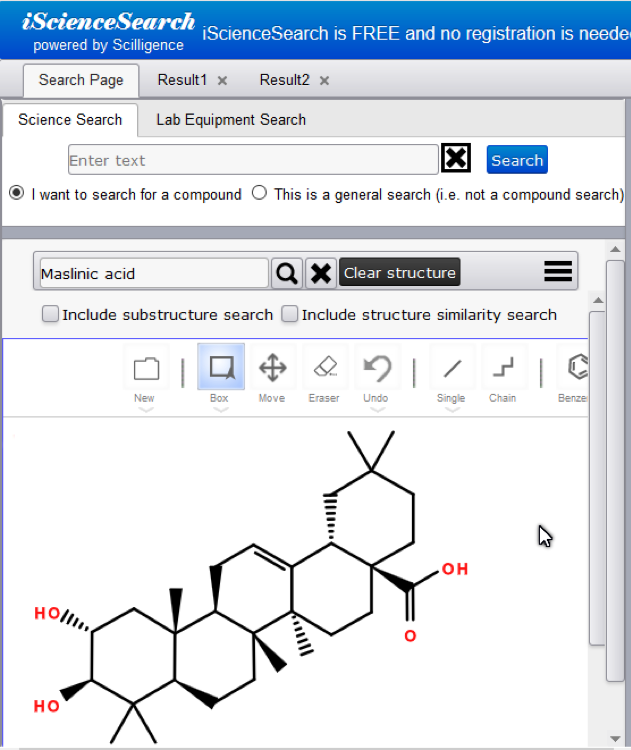 The start page provides a sophisticated chemical editor, full structure, substructure and similarity searches are supported. You also can search by identifiers like CAS Registry numbers, chemical names or free text. Irrespective if you start your search by structure or text such as a chemical name, we search in the background, related search terms that automatically get added to the search. For example, you do a text search for ‘maslinic acid’, we automatically extend the search by including the chemical structure, the CAS registry number, the IUPAC name and other well-known synonyms giving you results in sources that contain only the synonym such as ‘crategolic acid’. This feature of a chemical intelligent query extension is unique.
The start page provides a sophisticated chemical editor, full structure, substructure and similarity searches are supported. You also can search by identifiers like CAS Registry numbers, chemical names or free text. Irrespective if you start your search by structure or text such as a chemical name, we search in the background, related search terms that automatically get added to the search. For example, you do a text search for ‘maslinic acid’, we automatically extend the search by including the chemical structure, the CAS registry number, the IUPAC name and other well-known synonyms giving you results in sources that contain only the synonym such as ‘crategolic acid’. This feature of a chemical intelligent query extension is unique.
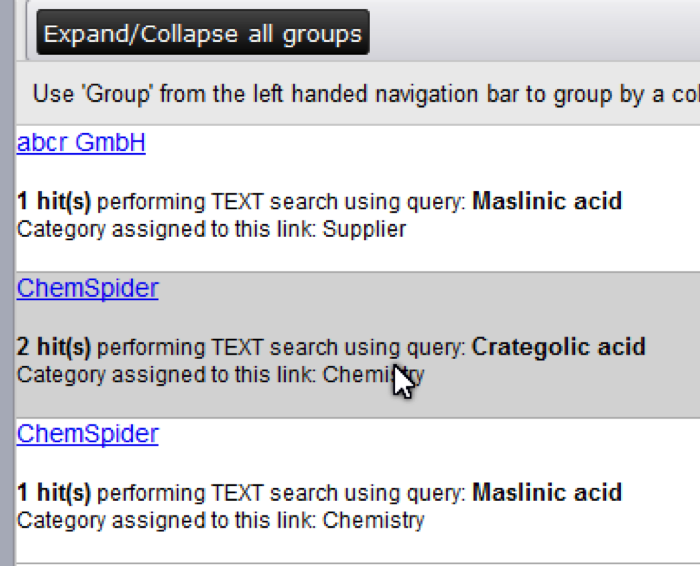 iScienceSearch searches about 100 websites and databases. Classical search engines, such as Google, index websites and not databases, such missing many chemical data. Chemistry specific searches such as substructure or structure similarity searches are not possible in Google.
iScienceSearch searches about 100 websites and databases. Classical search engines, such as Google, index websites and not databases, such missing many chemical data. Chemistry specific searches such as substructure or structure similarity searches are not possible in Google.
iScienceSearch results are always grouped by website. That means, if you find more than one hit in a given source for your search term, you only get one result link. The landing page of a result is equivalent of executing the search in the native source. The result page can easily be filtered, sorted and grouped by various criteria.
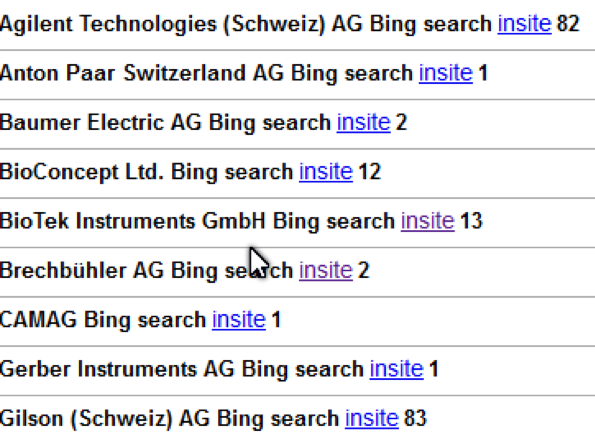 A second tab will open the “Lab Equipment Search”. For instance, if you search for “electronic pipettes”, you will get a list of companies that provide such instruments. The advantage is that you get only one hit per company, even if the search term appears in many pages of the company. This means you see also suppliers that would never become visible in Google because they would appear not on the first pages.
A second tab will open the “Lab Equipment Search”. For instance, if you search for “electronic pipettes”, you will get a list of companies that provide such instruments. The advantage is that you get only one hit per company, even if the search term appears in many pages of the company. This means you see also suppliers that would never become visible in Google because they would appear not on the first pages.
iScienceSearch is free and no registration is needed. The iScienceSearch homepage is http://isciencesearch.com/iss.
A mobile friendly version is available using the link https://www.ilmac.ch/sciencesearch.aspx.
If you are interested to make your website searchable via iScienceSearch, please contact us.
Open sourced based chemical compound registration system
Targeted to startups or small to medium sized companies, looking for an attractively priced system, that allows to register chemical structures and all the associated data in a relational database and make them easily searchable. The system is already used by several customers, and has proven its usability and stability.
Open sourced based (RDKit, PostgreSQL) - highly flexible data model, that allows to register batches, salts, inventory data, analytical data and assay data - user rights management - full audit trail of all database operations - supports both interactive and bulk registration - responsive Web User interface including free chemical drawing tool - support for sorting, filtering and grouping all of your data - flexible report management.
Cheminformatics consulting and solution provider
We work since almost 30 years, in the cheminformatics area, and have a proven record of being a capable and reliable solution provider.
Let us know your projects, and we are happy to discuss and deliver possible solutions.
Contact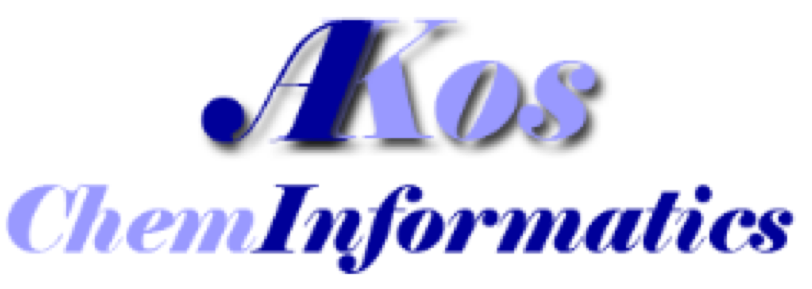 AKos Cheminformatics
AKos Cheminformatics
Austr. 26
79585 Steinen
Germany
+49 7627 970068
www.isciencesearch.com
David Spichiger, SCS
22.05.2019
Chemspec Europe, Messe Basel, June 26-27, 2019
Transforming challenges into opportunities
Operating in a highly competitive market with complex environmental guidelines, the fine and speciality chemicals industry is currently experiencing a multitude of pressures whilst benefiting from high levels of investment, especially in green and bio-based technologies. With the right mindset and information, the current challenges can be turned into opportunities for innovation and business growth.
Now in its 34th edition, Chemspec Europe 2019 unites an impressive array of experts, scientists, managers and thought-leaders and provides a powerful and well-known industry platform to discuss the latest market trends, technical innovations, business opportunities and regulatory issues in this rapidly changing market.
Exhibitors at the fine and speciality chemicals exhibition are manufacturers, distributors, regulators, equipment suppliers, raw materials suppliers, traders, agents and consultants, featuring the full spectrum of fine and speciality chemicals for various applications and industries: pharmaceuticals, agrochemicals, polymers, food and feed ingredients, flavours and fragrances, pigments and dyes, paints and coatings, household and cleaning chemicals, adhesives and sealants, petrochemicals, leather and textile chemicals, electronics and many others.
Additionally an outstanding conference programme provides further knowledge and insights into major industry developments as well as key strategies adopted by industry leaders to succeed and grow. All visitors and exhibitors are invited to attend free of charge.
Chemspec Europe 2019 will take place from 26–27 June 2019 in hall 1.0 of Messe Basel, Switzerland. The Basel region is one of Europe’s major hubs for the fine and speciality chemicals industry and borders three of Europe’s strongest countries in this sector – Germany, France and Switzerland.
Don't miss the key industry event of the year!
David Spichiger, SCS
21.05.2019
Page 65 of 301

